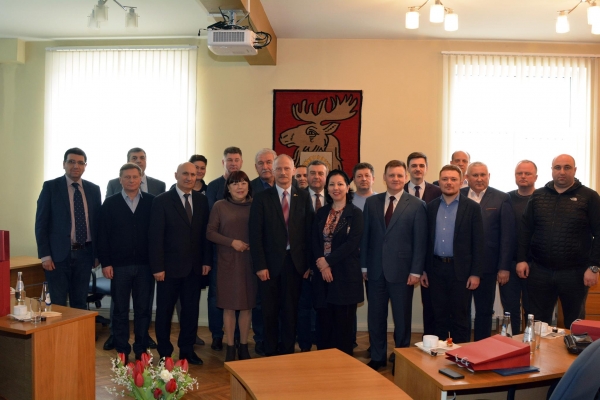Case studies, District heating, Municipal buildings and facilities, Others, RES, Residential buildings, Street lighting, Transport
Experience sharing program for Covenant of Mayors’ signatories “City2City” in Latvia – day 4

The fourth and final day of the program “From City to City” was devoted to studying the experience of implementing projects in the field of energy conservation and energy efficiency, the use of renewable energy sources, energy management and the implementation of the principles of “smart city” in Jelgava.
Jelgava is the fourth largest city in Latvia with a population of about 61,000 people, located in the southern part of the Zemgale Lowland on the Lielupe River, 42 km from Riga. The traditional areas of production are the food industry, metal and metal products, engineering, woodworking and furniture production.
The representatives of the cities signatories of the Covenant of Mayors were met by the Chairman of the Jelgava City Council, Mr. Andris Ravins. In his speech, Mr. Ravins talked about the three main areas of development of the city, which is an economically developed center of knowledge, technology and innovation, which emphasizes education, culture, tourism and sports, and is an important logistics center of international and national importance.
Of particular interest to the audience was the experience of the city in creating the Municipal Center for Operational Information and the introduction of remote control systems for street lighting and traffic flow, monitoring urban infrastructure, as well as modeling flood zones and early warning of residents in risk areas. After the presentation, Mr. Ravins answered questions from the program participants.
The next presentation was devoted to the participation of the city in the Covenant of Mayors, the process of implementing the SEAP and the results achieved in this direction, in particular a significant reduction in greenhouse gas emissions from the production and distribution of heat energy, as well as plans for the city to join the new Covenant and commitments to a 30% reduction CO2 emissions and the development of an adaptation strategy.
After the meeting at the city mayor’s office, participants visited a boarding school and an apartment building where they implemented comprehensive energy efficiency measures, with financial support from the city hall, the European Union, the German development bank KfW and residents.
The next step of the program was a visit to the biomass-powered new cogeneration CHP, which provides energy for up to 85% of the load of central heating in Jelgava.
The station was commissioned by Fortum in September 2013, and the total investment in the construction of the station was 70 million euros.
The station allowed to abandon the use of imported fossil fuels (natural gas) in the central heating system and move to a renewable resource – wood chips. As a result, a significant reduction in greenhouse gas choices was achieved, a reduction in energy production costs and, as a result, a reduction in heat tariffs for end-users.
Electric power station is 23 megawatts, and heat – 45 megawatts. The station produces 110 GWh of electricity and about 230 GWh of thermal energy annually. The generated heat energy is supplied to cover the main volume of heat load of the central heat supply of the city of Jelgava, while electricity is supplied either to the distribution network (Latvenergo) or sold on the free market at a market price. About 16,000 households and 400 commercial organizations are the consumers of thermal energy of the station.
The implementation of the project to switch from fossil fuels to wood chips reduced the station’s greenhouse gas emissions by 75%, compared with the level of elections in 2010, and significantly contributed to the city’s obligation under the Covenant of Mayors.
After the meeting with the station management and visiting its main infrastructures participants visited the Municipal Center for Operational Information of the city of Jelgava and got acquainted with the technical and administrative aspects of its activities.
